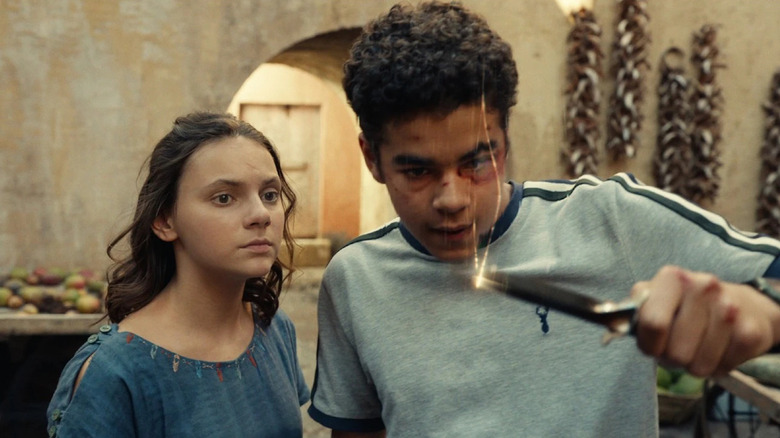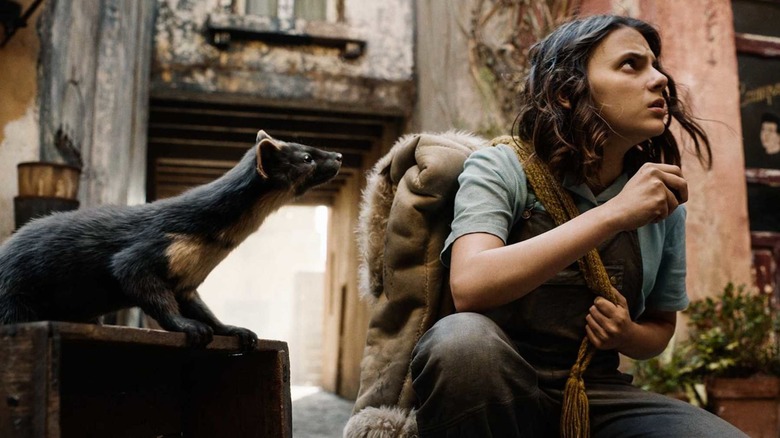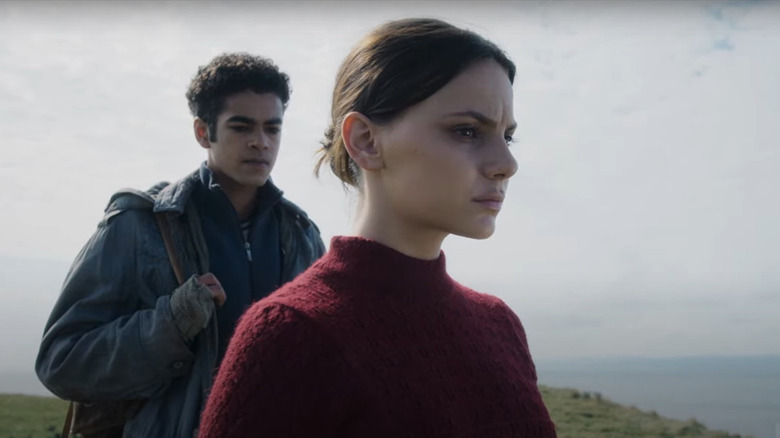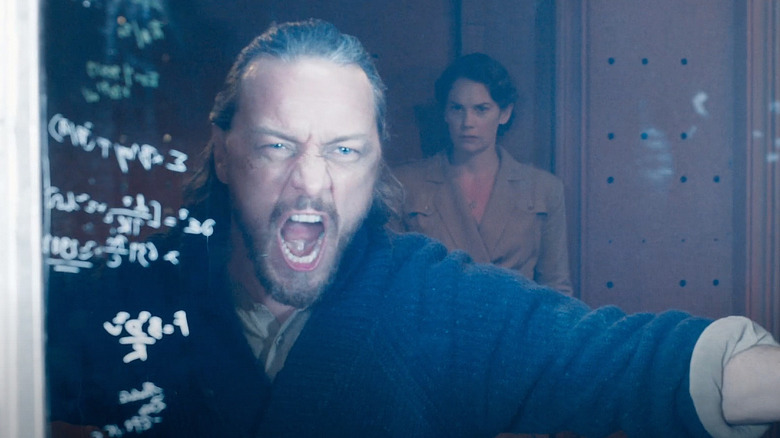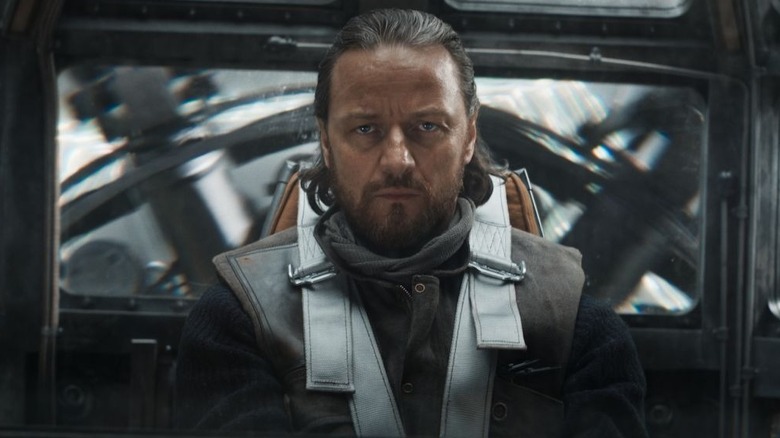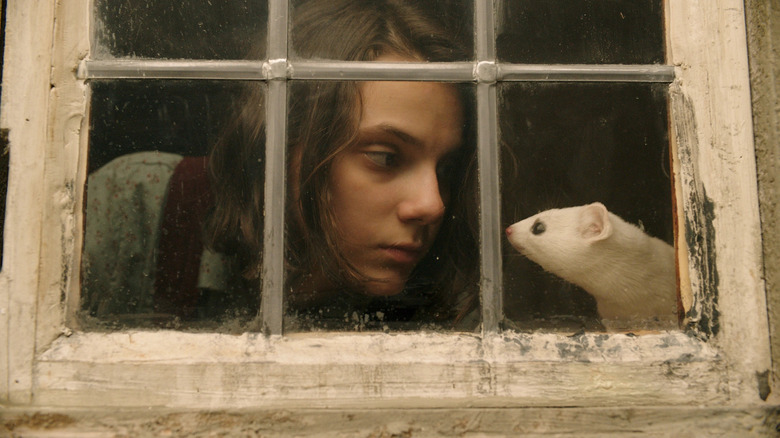His Dark Materials Showrunners On The Difficulties Of Adapting The Final Book In The Trilogy [Exclusive Interview]
We've waited two long years to see how HBO's adaptation of "His Dark Materials" will wrap up Philip Pullman's epic trilogy, and the show finally returns tonight with the fate of multiple worlds hanging in the balance. The series has a tough task in taking on "The Amber Spyglass," making for an incredibly ambitious third and final season. None of Pullman's books are built for an easy adaptation, but the last installment of this trilogy is particularly large in scope, with more fantastical worlds and heady concepts than ever.
Executive producers Jane Tranter and Dan McCulloch are well aware of the time and space needed to properly tell this story. /Film was able to speak with them about season 3 overall and the way they approached something so difficult to take from page to screen. Both seemed quite excited about the new episodes and the opportunity to not only adapt Pullman's work, but also to expand upon it.
This interview has been lightly edited for clarity and brevity.
'Ultimately, His Dark Materials is all about Lyra'
"The Amber Spyglass" is significantly longer than the first two books. Had you considered splitting season 3 into two seasons or adding more episodes?
Tranter: We did consider splitting into two seasons, and I think I said in a heady rush of excitement at the 2019 San Diego Comic-Con when we were first revealing season 1 of "His Dark Materials" to an audience, I said, "Oh, I think we need two seasons to do this." But actually, in the cold light of looking at it and thinking, "All right, how do we tell the story?" it actually felt like the more intensely you can tell the story of Lyra and Will's journeys through the worlds, the stronger it was going to be. I think it is really, really tempting in today's fantasy television marketplace to extend. I kind of feel that "His Dark Materials," to some extent, bucks the trend a bit with some of those other fantasy pieces, partly because it is something which is available for kids to watch as well as adults.
You know, it's an adult book that kids could or should read. It's a rare beast in something which is as high fantasy with as dark themes as it has, that it also has children right at the center of it. And it has a completely different budget level to any of the other shows. And I think we felt that we needed to kind of keep pure to "His Dark Materials." It was a trilogy. We didn't have to extend it. Maybe another couple of episodes might have been good. It might have given us a chance to see a little more of Mary Malone's journey, for example. Or it might have given us a chance to spend a bit more time with the Gallivespians. But ultimately, "His Dark Materials" is all about Lyra. Lyra's the first word and the last word of that trilogy. And that really, if we're not with Lyra, maybe we are kind of veering from where we should be.
So in the end, eight episodes is what we did it with. I hope that's all right, and it doesn't feel too crushed or rushed. We felt that just going for a very intense experience was probably the right thing in the end.
I didn't think it felt rushed, personally.
McCulloch: That's the main thing.
'It's an odyssey of an adventure between two characters'
Doing a book a season definitely makes sense, but as you were just saying, there isn't a ton of room to expand doing it that way. Is there a certain plot point you wish you could have devoted more time to, or anything that you felt heartbroken that you had to leave out?
McCulloch: I think there was definitely the ambition to go further. And when you're in the foothills of exploring any new season, the ideas are firing away. And we're chatting to the writers, Jack Thorne and Amelia Spencer and Francesca Gardner, we're working with them and understanding how deep we want to go in each world.
But I do feel in the end it's an odyssey. It's an odyssey of an adventure between two characters who get mixed up in a complicated adult world and adult head space. But it always comes back to these two, and where it is they're going. And I do feel that you possibly explore too far down other roads at the cost of the main storyline. And we were careful to avoid that.
I mean, just for me, I would've loved to have seen more of the Gallivespians and perhaps gone back to their world and kind of explored that. But then maybe they're all the more mysterious and strange for us not going to see their world. Maybe they didn't want us to go there.
'As Philip Pullman said to us, he left us with a problem'
"The Amber Spyglass" introduces even more new worlds and fantastical creatures: Angels, the Land of the Dead, Gallivespians, Mulefa. Was this the most difficult book in the trilogy to adapt?
Tranter: Yeah, definitely. It definitely was. I think it had two things that really gave us pause for thought. One was, as Philip Pullman said to us, he left us with a problem. And we thought, "Oh, you mean the Mulefa? You mean the Gallivespians?" And he was kind of like, "No, I mean Asriel." You know, Asriel's such a dominant character. He's a brilliant character. He's discussed the whole time. But we know him through reputation rather than dramatic action, until much later.
And yet, in the book, there's a narrating voice, or people telling you what he's doing. So we had to dramatize that, which actually Philip Pullman loved. He was really pleased that we did that, and that we got James back to be able to spend three episodes really laying down what this republic's all about, what Asriel's doing, and how is the science going to support that?
So that was one thing. I think the second thing that was really challenging was the introduction of the angels. So the angels were challenging both in terms of their physicality, and we really didn't want them to be CGI angels the whole time, because then we wouldn't have been able to give them character and life in the way that Pullman so surely does, and confidently does, with Baruch and Balthamos, for example.
We had to find a way of being able to give them physical human form, so that we could play scenes for emotion. And how they moved from angelic form to physical form, what the rules were, if you like, behind all of that was complicated. And then the other thing is suddenly from nowhere — we've been in worlds which are like but unlike our own. And then suddenly, we've got angels landing, and people when they hear the word angel, you think about celestial beings, it comes with all this kind of iconic imagery and biblical story to it.
Suddenly there are these angels talking about a battle between good and evil, and the Kingdom of Heaven and the Clouded Mountain and the Authority. Suddenly, the language shifts and changes. So we were constantly looking to pull that into as Asriel's war, and what Asriel's doing. And ultimately, what does that mean for Will and Lyra? And where's Mrs. Coulter in all of this? So what does that mean to the Magisterium, or all the forces of oppression in all the different worlds? And it was literally like we were taking this big kind of balloon of plot and constantly trying to tether it to what was going on and give it authenticity. That was highly enjoyable, but was tricky to do.
Jack Thorne's invention of the character Alarbus, for example [...] was a very clever way of being able to get across a lot of information and context about the enemy that Asriel will be facing in a way that felt dramatic and dynamic.
'We had to scrap it entirely'
I know there was a lost episode focusing on Asriel, that was initially meant to release with season 2, but was canned due to the pandemic. Were elements of that incorporated into season 3, or did you just have to scrap it entirely?
McCulloch: We had to scrap it entirely. It was entirely omitted.
Oh, no.
McCulloch: Asriel is only referred to in the second book somewhat. And it was our opportunity to do a little bit of explaining about what he got up to when he walked through that rip in the sky. We were in very close consultation with Philip about what that might be, as well as James. And it worked as a standalone piece. It's very much designed to work as a standalone piece.
I think, in terms of what we learned and we understand about Cittàgazze, the Spectres, and certainly what Asriel got up to next, I don't think anyone at home has missed out in terms of the meanings of everything. Everything sits right in terms of what people should understand and know about the universe of "His Dark Materials." We just don't get to tell that little bit of Asriel adventure that went on, unfortunately. We got to shoot about four or five hours of it before lockdown was called and we had to send everyone home.
Tranter: But actually the loss of that episode did have some influence on what we did, how we positioned Asriel in the opening of season 3, where we see Asriel go and recruit Commander Ogunwe in a different world, because if we'd had that episode, we would've been able to explain more what Asriel was doing, what his point and purpose is, what he hoped to achieve, what his war was. And the idea is that he was going to talk to the head of the guild in Cittàgazze, and actually it was good in the end, because it gave us a chance to expand the role of Commander Ogunwe, and actually see Asriel recruit him.
Personal daemons
What do you think your daemon would settle as?
Tranter: Oh, interesting. So, I have gone through various things. I just thought initially my daemon must be a wolf, partly because the company. But I just thought it must be a wolf. And then I realized that was just kind of like a dream and there's no way I'm a wolf, as I'm more of the pit pony. One of those sturdy little workhorse ponies who go down the coal mines. And then Philip Pullman said that I was like a hummingbird, because I was always moving so fast and in such a busy way. I also think perhaps he meant that I kind of like made a loud noise in his ear quite often, in a mildly irritating way. So maybe it's that. I don't know. One of those.
McCulloch: My daemon hasn't settled yet. It's still changing. I feel like he will get there soon.
"His Dark Materials" season 3 premieres on HBO on December 5, 2022.
